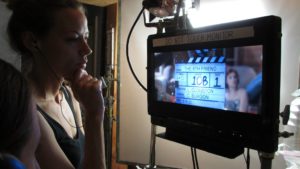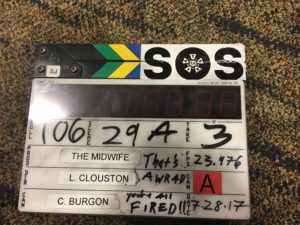As the director of Lifetime’s 2018 thriller The Midwife’s Deception, Letia Clouston has made pristine superhero films on the streets of NYC to holiday favorites for beloved networks. She’s not waiting to be hired. Clouston is directing now!

I love your tagline: “I’ll direct the shit out that film.”
Ha! Actually an executive producer for one of my films told me he specifically hired me because of that tagline. A couple years ago I was editing my reel and used it as a title card, expecting to replace it later by something more “professional” – I realized nothing else sums up my personality as accurately.
What’s the path that led to directing The Midwife’s Deception? You are the writer as well, so did you pitch this initially to Lifetime?
The film was an idea developed by the studio, MarVista Entertainment. The producer had already worked with me as a director on a few other films and I often rewrote projects I worked on. But this was my first full writing gig so they set some parameters with genre, characters, and general story-line and I wrote the script from there.
Were there hurdles in order to direct or was that part of the deal from the outset?
Directing was always part of the deal. I had directed films for MarVista previously and we work well together.
How did your relationship with the studio start and how have you sustained the relationship to become a first choice director?
When I got out of AFI, I wasn’t quite ready to wait by the phone, so I grabbed a DP I worked with at AFI and began shooting a sci-fi web series called BROKEN TOY. We started with two actors and a ridiculous amount of fake blood in my kitchen and then each episode after that got a little more and more ambitious. It was a lot of work after our day jobs and hardly anyone saw it but it kept me directing.
Another DP, Richard Vialet, showed a producer what I had been shooting for $100 an episode (mostly spent on pizza) and I was hired for a low-budget feature that was co-produced by MarVista.
These features are typically shot over 13 days and it can be stressful on a small budget. But after that, I was hired on a few more and I often needed to rewrite the scripts due to production issues: We’d lose locations, didn’t have money for background actors, etc. After four movies shot like this were all bought and aired internationally, an Executive Producer hired me for a feature fully produced by MarVista.
I absolutely say yes to everything that is sent my way. Always. And for now, that’s really worked for me. And I can honestly say that while the producers I’ve worked with are part of a corporate machine, each one of them has shown an overwhelming commitment to make a fun, creative project that an audience will enjoy. It’s always a nice balance between financial responsibilities with artistic freedom, and that makes it a joy.
How is a directing deal structured for TV?
Contract points are confidential but there are clear steps outlined – like when I must become exclusive to the studio for prep work, shooting, and delivery. My writer’s contract is similarly set up with a timeline. And it’s great because I can clearly see how many weeks I’m unavailable for other projects and I can really plan my work around it.
For directing Midwife, what was your timeline for prep, rehearsal, shooting, delivery?
I had about a month for official prep (although I mentally prep while writing it). We had no rehearsal time, 15 days for shooting, and about 9 weeks for post.
It was an unusually fast turnaround time due to the buyer’s schedule. There are two buying periods a year and you have to get the film finished in time for those.
What is most important for you in tackling a TV Studio project: is it pleasing the studio, developing your craft, diversifying your work?
I think pleasing the studio and diversifying my work actually feed into the ultimate importance for me: developing my craft. Being a good director will almost always involve pleasing the studio during the project.
What do you wish you could do on these projects that you can’t?
Time is always the coveted treasure just outside the director’s grasp. I don’t care if it’s a $200 million film or a $5,000 – every director just wishes for more time. With extra time you can be a little more free with your shot selections and more open to happy accidents. But it doesn’t matter how pretty and compelling your film is if you don’t get it done.

Tell us about pitching yourself as a director for a network project and what you find important in that process?
Conveying passion and excitement for the subject matter is key. It can be a brutal process getting a film done so they need to see you are in love with it. And going in, you need to be clear in your mind why you’re the best person to tell this story and what you bring to the project.
Recently several big directors have been replaced due to disagreements or failing to meet the expectations of the Studio – Have you had a situation like that with a studio or company?
I’ve had a couple instances where I’ve felt very strongly that something should or shouldn’t be included in a film. My job as the director is to make those feelings known and offer solutions. But then you need to recognize when to back off. I can try a couple different angles on my point but if that doesn’t work, you have to move on.
Serve the story. Always. Remembering that will keep an ego out of the decision-making process. And calm, open dialogue almost always creates a balance between what I want and what the studio wants. And the number one advice is never ever lose your temper in front of people.
You seem to have a strong interest in genre – did you feel Lifetime was an opportunity to flex your genre interests?
Absolutely. My ultimate goal is to direct television, so I’ve been exercising my directing muscles in every genre to prepare for that—family comedies, rom- coms, horror, thrillers, holiday.
What are the significant differences between directing for a TV movie and a theatrical feature in terms of creative control, schedule, and preparation?
There are definitely expectations as far as genre. Lifetime has a very popular brand and they know what their audiences like. The Executive Producer and I were on the same page from day one and she was always supportive of my choices. So it struck a nice balance with the studio – letting me flesh out what I want creatively as long as the skeleton stays intact underneath.
There is definitely a time challenge, things happen very fast and there’s a tight schedule. But I enjoy it – you know it will get finished and get out in the world within a year. We started shooting last July and the movie aired on Lifetime this March.
It’s a great talking point to know that your movie will be released—it gives you a reason to call people for meetings or to find representation. You’ve got something to talk about that’s concrete.
How is casting a TV movie for a strong brand like Lifetime – are you open to cast your preferences? Same for crewing – can you bring in your own DP?
I go in for everyone’s auditions and saw hundreds of actors. It takes a lot of my time but it’s worth it in the end. I like to see how I connect with an actor personally in the room and I can’t do that through tapes.
Ultimately the studio has the last word on cast—but they do give my choices real consideration and weight. It’s definitely a collaboration. They hire a casting director and most of the time they like to stick with the same people they’ve used before, if they are available.
As far as crew, the studio will ask for my recommendations, first for the DP and Editor. I was able bring in the DP I’ve worked with since Cycle One at the AFI Conservatory, Chris Furukawa-Burgon. The studio then does its best to hire crew members I’ve recommended, but if we are on location we often need local hires. I’ve gotten really lucky meeting some fantastic professionals in other states.
How was the collaboration with Lifetime as far as notes and drafts?
For this project, Lifetime bought it after completion. So I didn’t work with them in the filming stages but MarVista knows Lifetime’s needs so we keep that in mind.
MarVista sent me the title, the characters, and the general idea, and hired me to fill in all the beats of the story. I got hired to write it about 10 months before we went into shooting. I wrote an outline that got approved and then moved on to a first draft, got notes, then a second draft, then we waited to find out our shooting schedule before I started the final polish.
Has working for a major network and directing your own features opened up doors to streaming companies like Netflix or Amazon?
I’ve had a number of films stream on those services and love the work they’re churning out. So I’m ready whenever they call!
Have you already or are you planning on pursuing streaming platforms that produce – I’ve heard it’s tricky to get Netflix to produce.
I’ve heard the same but after directing eight features and dozens of shorts in nine years, I’m ready to storm the streaming beaches!

What’s your advice for directors looking to direct a network movie or series? Having made many projects, what do you believe is the best path forward?
The only way to be a better director is to direct. I made the choice early on to direct everything I could get my hands on. And if I didn’t have a gig, I’d make my own. I did a sci-fi web series and a VFX heavy superhero short on the streets of NYC for no money. It can be rough but I’ve learned so much throughout all the projects and it’s helped me prepare for anything and everything.
Demon in the Dark? You shot that for no money –you had Times Square, VFX, helicopters?!
We had a three person crew (DP, my brother-in-law, and myself) and ran around NYC at night during a particularly cold March. NYC is incredibly supportive of the arts and as long as you don’t set up sticks or lay out cables, it’s fair game.
So we shot in Columbus Circle, Times Square, Penn Station, etc.
My producing partner, Matt Clouston, was the lead actor and did all the VFX work himself. So our costs were limited to faster lenses (we had no lighting), pizza, coffee, and one green screen day. Everyone involved donated their time to the project and, honestly, eating together in Chinatown and laughing at 4am is going down as one of my favorite filmmaking memories.
I’d never ask anyone to work for free but if someone volunteers to work with us, they know we’re committed to making something fun and often expensive looking.
When we started, we had very little experience with VFX. With our first sci-fi series, we actually added helicopters frame-by-frame in Photoshop. Luckily, growing technology and the online tutorials have allowed us to create some pretty amazing things. Working with After Effects and creating a VFX heavy project like this is incredibly valuable because I’m well aware of what the VFX artists need from me on set to facilitate their work.
Did those projects between projects help your desirability with studios?
I love comic book movies and sci-fi, but not many women are getting hired to direct those genres. And, more than once, I’ve even heard “Women don’t like directing these films.” So creating these projects on my own, shows my range, what I’m capable of, and what I’m passionate about. Even if it doesn’t catch the eye of the studio, it’s still worth flexing your directing muscles.
There have been questions lately as to whether or not representation of an Agent or Manager is helpful in leveraging work – what has been your experience?
I don’t have representation currently, I’ve always gotten directing gigs through producers that have referred me to other producers. But I do see the need for one. When I’m on set in a hurricane trying to shoot a feature in 13 days (which happened), it would be nice to have someone out there looking for the next project.
So for you – it’s a matter of partnering to set up your next project? You have a production company Forewarned Films, has that helped having a team to share the burden of dreams?
My production company, Forewarned Films, has been invaluable to my career. It’s been so beneficial to my work as a director to be able to develop scripts and ideas and see them through and get them out in the world.
What is next for you Letia?
I got hired to direct a Christmas movie in Canada in April and to write and direct a true crime feature. I also have a few other projects in development looking for a home.
Congratulations Letia – check out The Midwife’s Deception on Lifetime!

Pictures By Letia Clouston Interviewed By Sheena McCann

